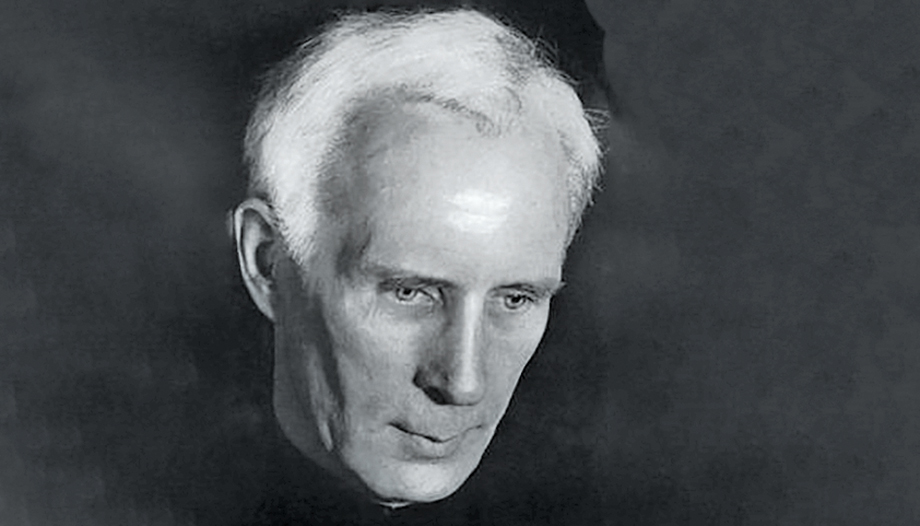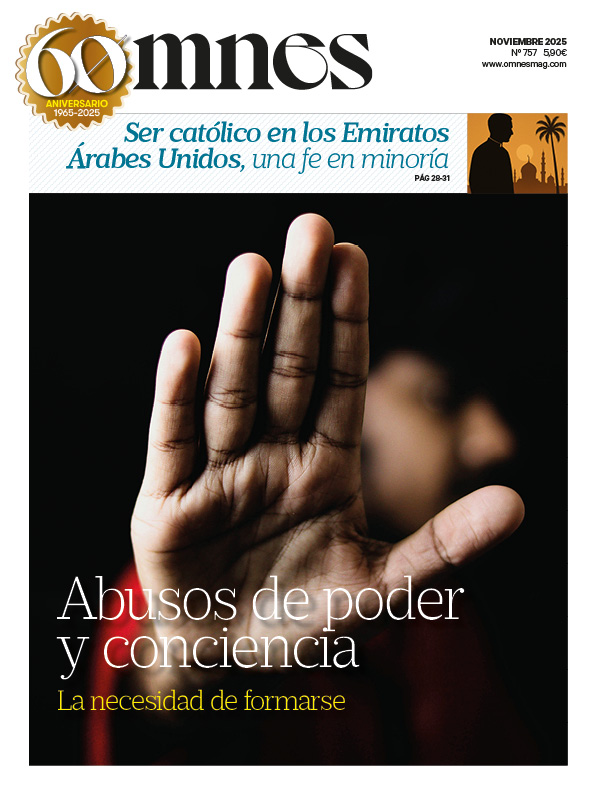Testo originale in inglese qui
It was not difficult to see how both Nazism and communism had their origins in the anti-Christian component of modern times. In both, in different ways, philosophical presuppositions (of Feuerbach in one case, of Nietzsche in another, and in both, of Hegel) and false scientific claims about materialism (dialectics) or biology (racism) were mixed. And both tried to build a new city with a culture without God in favor of a new man. But during the construction of the tower of Babylon, which is also the apocalyptic Babylon, full of Christian blood.
The book is composed of several articles that De Lubac wrote during the Second World War and the occupation of France by the Germans. Originally they were different articles. This is how the author describes them with his characteristic modesty in the prologue. Ma avevano l'unità dell'analisi: "Sotto le innumererevoli correnti che affiorano sulla superficie esterna del nostro pensiero contemporaneo, ci sembra che ci sia [...] qualcosa come un'immensa deriva: per l'azione di una parte consideravole della nostra pensante minoranza, l'umanità occidentale rinnega le sue origini cristiane e si separa da Dio" (p. 9). And he continues: "We are not talking about an atheism that is typical, more or less, of all times and that does not offer anything significant [...]. Modern atheism becomes positive, organically constructive. It does not limit itself to criticize, but has the will to render useless the demands to directly provide the solution. "L'umanesimo positivista, l'umanesimo marxista, l'umanesimo nietzschiano sono, più che un atheismo propriamente detto, un antiteismo e più precisamente un anticristianesimo, per la negazione che ne è alla base" (El drama del humanismo ateo. Encuentro, Madrid 1990, pp. 9-10).
The article is divided into three parts. The first part deals with Feuerbach and Nietzsche on the death of God and the dissolution of human nature and links Nietzsche to Kierkegaard. The second part is dedicated to Comte's positivism and his substitutive atheism. The third part, with the expressive title of The Prophet Dostoevskij, shows how the Russian writer, sensitive to this, had intuited the problem: "It is not true that man cannot organize the earth without God. What is certain is that without God, in the end, he can only organize it against man. The exclusive umanesimo is a disuman umanesimo. (page 11). Like all the work of De Lubac, this book is full of quotations and references and one can sense a serious and intense reading effort. And a vast culture. It is also noted that he always treats the thoughts of others in a balanced way, with great discernment and irreprehensible intellectual honesty.
Feuerbach and Nietzsche
De Lubac describes the Christian idea of the human being and his relationship with God as a great form of liberation that comes in the ancient world: "Il Fatum è finito!" (p. 20), the tyranny of fatality: behind it there is a God who loves us. "Ora questa idea cristiana che era stata accolta come una liberazione comincia a essere percepita come un giogo". Non vuoi essere soggetto a niente, nemmeno a Dio. The utopian socialists, from Proudhon to Marx, see in God the excuse that sanctions the unjust order of society: "per grazia di Dio", as it is known on the real world.
Feuerbach and Nietzsche undermine this order. Feuerbach will do so by postulating that the idea of God is generated by sublimating the aspirations of human beings, who are deprived of the thought to which they aspire, and therefore can no longer be their own. For Feuerbach, the Christian religion is the most perfect and, therefore, the most alienating. This idea was like a revelation for Engels or Bakunin. And Marx will add, in his economic analysis, that the original alienation is what generates the two fundamental classes, who owns the means of production (owners) and who does not own them (workers) and this creates in history that social structure that ends up being accepted by religion. It will also give them a practical and political solution: it is no longer a matter of thinking, but of transforming. It is a more radical revolution than the French one.
According to de Lubac, Nietzsche did not sympathize with Feuerbach, but was influenced by Schopenhauer and Wagner. The world as volontà and representation of Schopenhauer is influenced by the theses of Feuerbach and incanta Wagner. Nietzsche's Volontà di potenza is based on the indignation for Christian alienation and on the desire to reconquer full freedom: "In Christianity, this process of the extraction and development of the human being reaches its peak", he says. And this indignation is present almost from the beginning of his work. It is necessary to wait for God's error. It is not about showing that it is false, because it would be a never-ending process, but we must wait for it from the thought as an evil, once it has been smashed because we know how it is formatted. Occorre to proclaim as in a crociata, the "death of God", colossal and tragic contest, perfect spectacular, as it appears in Thus spake Zarathustra. Di conseguenza, tutto va rifatto e soprattutto l'essere umano: ci troviamo di fronte a un umanesimo ateo. De Lubac comments: "He does not see, De Lubac comments, that the Columban against whom he is besmirching and exorcising is himself Columban who gives all his strength and greatness [...], he does not realize the servility that undermines him" (p.50). De Lubac does not fail to emphasize that Nietzsche can deride the Christian menace because in modern Christianity, so comfortable, there is almost no trace of the vibration of the Christians who have transformed the ancient world.
Kierkegaard has many things in common with Nietzsche: the solitary fight against the Borghese, the passion for Hegel and his astrology, the awareness of fighting alone with great sophistication. But Kierkegaard is a man of radical faith, an "archetype of transcendence", of that dimension without which the human being closed in himself can not but be subjected to his limits and baseness.
Comte and Christianity
Comte's long Corso di Filosofia Positiva was published the same year as Feuerbach's L'essenza del cristianesimo (1842). And as a commentator of the time noted: "L. Feuerbach a Berlino, like Auguste Comte a Parigi, proposes to Europe the cult of a new God: the 'human race'" (p. 95).
De Lubac analyzes with lucidity the famous "legge dei tre stadi", that Comte formulated at the age of 24 years. "Costituisce la cornice in cui riversa tutta la sua dottrina" (p. 100). It passes from a supernatural explanation of the universe with God and God ("theological state"), to a philosophical explanation for astrological causes ("metaphysical state") and, finally, to a completely scientific and "natural" explanation ("positive phase"). It does not become an indirect one. All that is above is "fanaticism", a way of thinking in vogue at the time. Comte did not consider himself an atheist but an agnostic: he believed that he had demonstrated that the idea of a God was falsely reached and that this demand had no sense in a scientific society. But it is necessary to fill the gap, because "that which is not replaced is not distributed" (page 121). And he wants to organize the cult of the Umanity. This will lead to a series of rather extravagant initiatives. De Lubac comments: "In pratica porta alla dittatura di un partito, per meglio dire, di una setta. Nega all'uomo ogni libertà, ogni diritto" (p. 187). Siamo nella linea dei "fanatismi dell'astrazione" che poi poi denuncerà V. Havel, or of the projects of "social engineering" that the Marxists will carry out, but in this case, fortunately, they will be almost innocuous.
Dostoevskij prophet
It is interesting to note that the third part of the book is entitled The prophet of Dostoevskij. De Lubac reprende un'osservazione di Gide: in many romances the relationships between the protagonists are described, but that of Dostoevskij also deals with the relationship "with himself and with God"(p. 195). In this inner work, Dostoevskij has been able to represent the changes that the option for nichilism and life without God entails in a person. Dostoevskij is a prophet in this sense: he makes us see what happens in the souls in which new ideas are formed. He allows us to imagine what would be successful in the soul of Nietzsche himself, the soul of an atheist in flight from God.
È interessante notare che De Lubac racconta che, nei suoi ultimi anni di lucidità, Nietzsche conobbe l'opera di Dostoevskij (Memorie dal sottosuolo), con cui si sentisi identificato: "È l'unico che mi ha insegnato qualcosa sulla psicologia" (200 ), Incontrò anche L'idiota, dove intravide i lineamenti di Cristo, ma percepì presto Dostoevskij come un amico: "completamente cristiano nel sentimento", conquistato dalla "morale degli schiavi". And he will comment: "Gli ho concesso uno strano riconoscimento, contro i miei istinti più profondi [...] la stessa cosa accade con Pascal" (p. 200).
When Dostoevskij was planning, at the end of his life, a great opera with an autobiographical background, he remarked: "The main problem that will present itself in all the parts of the opera will be what has tortured me consciously or unconsciously for all my life: the existence of God. L'eroe sarà, per tutta la sua esistenza, ora ateo, ora credente, ora fanatico o eretico, ora ancora ateo" (p. 205). He has not written it in the first person, but through the various characters he has created and has revealed to us the different stages of his believing, atheist, nichilist or revolutionary spirit.
E' passato il tempo per questo libro?
The confrontation between Nietzsche and Kierkegaard remains topical, even more topical the analysis of Dostoevskij which is still moving. But other things have changed. Nazism is incomparable with war. Communism, like a miracle, has expired with the 20th century (since 1989). Feuerbach or Comte were taught in the Faculties of Philosophy before Foucault and Derrida (without any mention of their critics). The political ideologies are incomparable, causing cultural fierceness.
However, the positivist background as the only faith in science survives and spreads, without Comte's eccentricities. There is no positivist cult and priesthood, even if there is the quasi pontifical Magisterium of some "oracles of science", as Mariano Artigas called them. But yes, there is an alleged materialism, which, in reality, has little foundation, given what we know of the origin and constitution of the world. Every day seems more and more an enormous explosion of intelligence, so much so that it is more improbable to differ the theory that there is only matter and that everything was made by me.
Marxism is obsolete, we say, but the immense ideological vacuum has been filled with the same planetary dimensions and the same propaganda and social pressure techniques as the secular ideology, developed after 1968. And this is due, in great part, to the fact that a syndicate, deprived of a political program (Marxist) and of an orizzonte for the future (the society without classes), has made a moral pretesa that rejects or at least copre the hard past. De Lubac, like the majority of his contemporaries, compressed the entire classical sinistra, would be perplexed. From the revolutionary left-wing we have moved to the libertarian left-wing (inspired by Nietzsche) and from there to a new ideological machine that, by dismantling the foundations of our democracy, makes its integrity a virtue. Since the end of the eighteenth century the intolerance is not Christian, but anti-Christian. And on this new umanesimo is worth the diagnosis that De Lubac finds in Dostoevskij: it is possible to ipotize a world without God, but it is not possible to do it without going against the human being. Dostoevskij, the prophet, has not imagined this drift, but has announced "Only beauty will save the world. "








